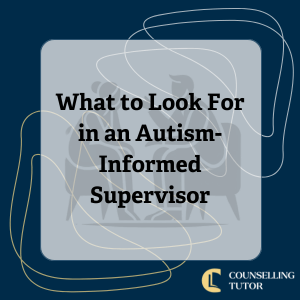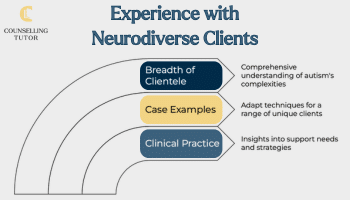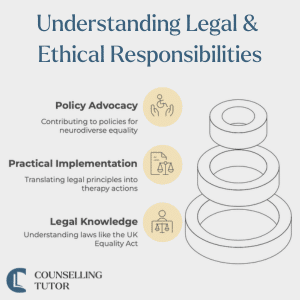Autism-Informed Practice Course
Gain the Knowledge & Skills to Support Autistic Clients with Confidence & Compassion
If you’re interested in becoming Autism-Informed, have a look at our Autism-Informed Practice Course.

Gain the Knowledge & Skills to Support Autistic Clients with Confidence & Compassion
As counsellors and psychotherapists, providing the best support to clients with autism starts with ensuring your supervision is informed by deep expertise and sensitivity to neurodiverse needs. Selecting an autism-informed supervisor is critical in enhancing your practice and delivering effective, respectful care.
This guide outlines the core qualifications, experiences, and qualities to look for in an autism-informed supervisor to ensure you receive the best guidance.

What to Look For in an Autism-Informed Supervisor
Supervision is more than a professional requirement – it is a cornerstone of ethical, effective, and client-centred therapeutic practice. For counsellors and psychotherapists working with autistic clients, the stakes are even higher. Autism-informed supervision ensures that you are supported in tailoring your approach to meet the unique needs of neurodiverse clients, creating a practice that is inclusive, empathetic, and aligned with the latest research.
An autism-informed supervisor bridges the gap between theoretical knowledge and real-world application. They guide practitioners in navigating the complexities of autism spectrum conditions while ensuring a commitment to equality and client-centred care. Understanding why this specialised supervision matters is the first step toward refining your practice.
An autism-informed supervisor must possess a strong foundation of knowledge and skills underpinned by continuous professional development and specialised training. Their qualifications should demonstrate a commitment to staying updated on the latest research, therapeutic approaches, and best practices in autism care.


An effective autism-informed supervisor must possess a deep and comprehensive understanding of autism spectrum conditions. This includes recognising the wide-ranging diversity within the spectrum and being attuned to the unique sensory sensitivities, communication styles, and behavioural patterns of autistic individuals.
They should be adept at tailoring therapeutic approaches to suit each client’s specific needs, ensuring sessions are both accessible and impactful. Their expertise should extend to understanding co-occurring conditions, such as anxiety or ADHD, and how these interact with autism, equipping them to guide nuanced, client-centred care.
Supervisors with hands-on experience working with neurodiverse clients gain insights into varying support needs, co-occurring conditions, and effective therapeutic strategies.
By sharing anonymised examples, supervisors demonstrate their ability to adapt techniques to meet unique client needs, offering actionable ideas for your practice.

Supervisors with diverse experience across neurodiverse populations bring a comprehensive understanding of autism’s complexities, preparing you to confidently address a wide range of client presentations.
What to Look For in an Autism-Informed Supervisor
Supervisors should thoroughly understand relevant legal frameworks, such as the Equality Act in the UK, which protects autistic individuals from discrimination. This knowledge must extend beyond theory, enabling supervisors to articulate how these legal requirements impact therapy settings, supervision practices, and client rights.
An effective supervisor demonstrates a strong ability to translate legal principles into practical action. This includes implementing reasonable adjustments for autistic clients—such as altering communication methods or therapy environments—and ensuring accessibility and inclusivity in therapeutic services. By modelling these practices, supervisors empower you to uphold ethical standards.

Supervisors who actively contribute to organisational policies or advocate for systemic inclusion are committed to promoting equality for neurodiverse individuals. Their leadership in developing frameworks that support accessibility and inclusion can serve as a valuable resource for supervisees navigating similar challenges in their practice.

Become a Skilled, Ethical & Confident Clinical Supervisor with the tools and knowledge to supervise effectively across all platforms.
A highly effective supervisor demonstrates genuine empathy and sensitivity toward autistic clients and their families. This involves acknowledging the diversity within the autism spectrum and understanding the unique challenges clients and supervisees face. A supervisor’s ability to approach situations with compassion creates a supportive environment for growth and learning.
Supervisors should adapt their style and guidance to the specific needs of supervisees and their clients. Flexibility in supervision ensures that both practical and emotional aspects of working with neurodiverse clients are addressed, cultivating a responsive and inclusive therapeutic approach.

Clear and constructive communication is a cornerstone of productive supervision. An effective supervisor should be able to simplify complex concepts, provide actionable feedback, and create an open dialogue. This approach builds confidence and clarity for supervisees handling complex client cases.
The best supervisors embrace a collaborative mindset, working alongside their supervisees to enhance skills, knowledge, and understanding. This partnership encourages openness, supports problem-solving, and creates a safe space for discussing challenges, ultimately empowering you to grow as a practitioner.
What to Look For in an Autism-Informed Supervisor
It means a supervisor who is knowledgeable about neurodiversity, understands the experiences of autistic clients and counsellors, and is capable of guiding supervisees in making reasonable adjustments, using inclusive language, and remaining up to date with relevant legislation and research.
Look for a supervisor who has experience working with neurodivergent clients, demonstrates ongoing CPD (continuing professional development) in autism/neurodiversity, uses inclusive and clear language, and treats every client as a unique individual (rather than applying a one‑size‑fits‑all approach).
You might ask about their experience with autistic clients, what training or CPD they have done in neurodiversity, how they adapt supervision to different communication styles, and whether they stay current with legislation and best practices relevant to autism.
Choosing an autism-informed supervisor is pivotal in shaping your professional growth and client’s outcomes. A well-qualified supervisor offers more than guidance—they provide a foundation of support that equips you to navigate the complexities of working with autistic individuals while maintaining ethical, inclusive, and client-centred practices.
By prioritising supervisors with the right blend of qualifications, experience, and interpersonal skills, you ensure your supervision aligns with the highest standards of care. The right supervisor empowers you to integrate equality, accessibility, and evidence-based approaches into your practice. This enhances your confidence and ensures clients receive thoughtful, respectful, and practical support tailored to their needs.
Assessing your options is an investment in your professional journey and in the lives of the neurodiverse clients you serve.
National Autistic Society: www.autism.org.uk
Counselling Tutor provides trusted resources for counselling students and qualified practitioners. Our expert-led articles, study guides, and CPD resources are designed to support your growth, confidence, and professional development.
👉 Meet the team behind Counselling Tutor
Notice any broken link or issues with this resource? Kindly let us know by email
Email us